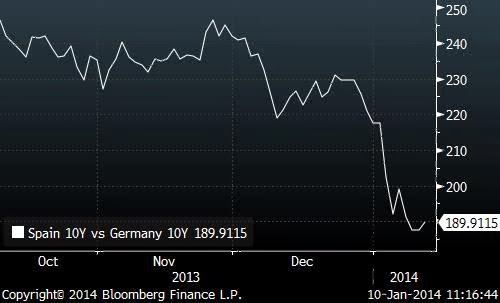Courtesy of CNBC
Fear of a Portuguese-style “left wing” losers’ coalition seems small as PSOE (Socialists) would need to agree with up to 11 different parties. Challenges for PP (Conservatives) to reach a government agreement despite the victory.
– Conservative party wins with small majority (123 seats) despite austerity backlash, but loses absolute majority, while Socialists get worst result in Spain´s democracy history.
– Vast majority of Spanish citizens voted for moderate, centre parties (PP, PSOE and Ciudadanos)
– Neither PP+Ciudadanos nor PSOE+Podemos+Communists reach clear majority for government.
– Key to stability and growth will be to find a coalition between Conservative PP and Ciudadanos and maybe PSOE.
– Biggest risk is a coalition of populist radicals Podemos with PSOE and other radical and nationalist parties looking for constitutional changes and anti-EU measures
– If a left-wing coalition unwinds all reforms made by the PP and starts a constitutional change it could mean 0.7%-1% impact on GDP and zero job creation.
– We can expect a few months of uncertainty, affecting investment, growth potential and investor confidence.
Read my article (here)
It was difficult to think that Spain would make a comeback in 2011 when the Conservative Party (PP) won the elections. The challenges were too large.
The previous administration, PSOE, Socialist, had left a deficit of 9% of GDP after promising a maximum 7%.
When the crisis started, the socialist government consciously decided to substitute the bursting real estate bubble with a massive civil works stimulus. It spent 3.2% of GDP, debt ballooned by 350 billion euro and destroyed more than 3 million jobs. On top of it, in the period from 2007 to 2009 the average annual trade deficit was around 6% of GDP and at one point in 2008 reached 9% of GDP.
Spain was a Keynesian dream becoming a nightmare.
When the socialist government left office, Spain had more than 40 billion euro in unpaid invoices from the public administrations to the private sector, the public savings banks presented a capital requirement of 100 billion euro and the regions and municipalities faced a bailout of 125 billion euro.
It was an unsurmountable situation.
However, after a large austerity plan that was split 50% in tax increases and 50% in spending cuts, and a very substantial set of reforms, including the financial sector, labor market, entrepreneurship programs and early payment schemes, Spain recovered.
Between 2014 and 2015 Spain started to grow well above the EU average. It led job creation in the Eurozone, with more than one million jobs, and brought unemployment rates back to September 2010 levels. It went from a massive trade deficit to a balance by 2015.
In summary, Spain undertook the largest adjustment seen in an OECD economy, 15 points of GDP, and managed to do so growing and creating jobs.
Despite critics´calls of a recovery fuelled by the ECB QE and low oil prices, these claims are easily refuted as Spain is growing more than countries with a similar sensitivity to interest rates and oil prices, like Italy or Portugal, and has recovered with no increase in total (public and private) debt.
However, all is not well and many challenges remain.
– A high unemployment rate, despite the reduction and the evidence that many jobs are hidden in the underground economy and counted as unemployed.
– A large fiscal deficit. Despite the massive adjustment, Spain´s deficit is well above the EU stability pact target.
– External debt remains at 100% of GDP and public debt at 97%.
The austerity plan helped bring Spain out of the living dead, but did not create social stability. Despite the conservatives´efforts to maintain social spending, the population perceived that the cuts were unacceptable. Public debt increased to 97% of GDP partially due to the bailout of the regions and savings banks as well as taking care of unpaid bills, but increasing pensions and keeping unemployment benefits didn´t please part of the public, as real wages fell. As in Greece, fringe parties started to appear fuelled by “magic solution” promises of default, massive increases in public spend and interventionist “miracles”.
In any combination, the new government will not have a strong majority, and most of the likely agreements may only come with parties who promise more spending.
The risk of Spain falling under the QE trap, putting all the bets on the European Central Bank, as it did in 2008, and go back to the same mistakes of deficit spending and public sector white elephants to “boost growth” is not small. Halting reforms and going back to past failed measures will likely give the same results. Less growth, less jobs, more debt.
Spanish political parties tend to mention the Nordic nations and Obama as examples, yet they support the rigidity and intervention of France and Greece, not the economic freedom and flexibility of the leading economies. And when you copy France and Greece you get the growth of France and the unemployment of Greece.
Let us hope the decision is not to bet on repeating 2008.
– Daniel Lacalle is an economist, CIO of Tressis Gestion and author of Life In The Financial Markets and The Energy World Is Flat (Wiley)






